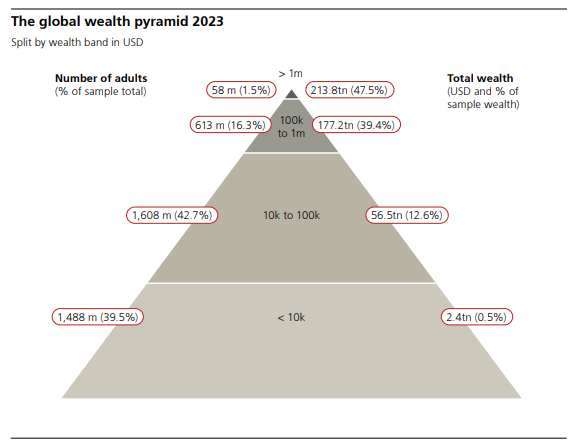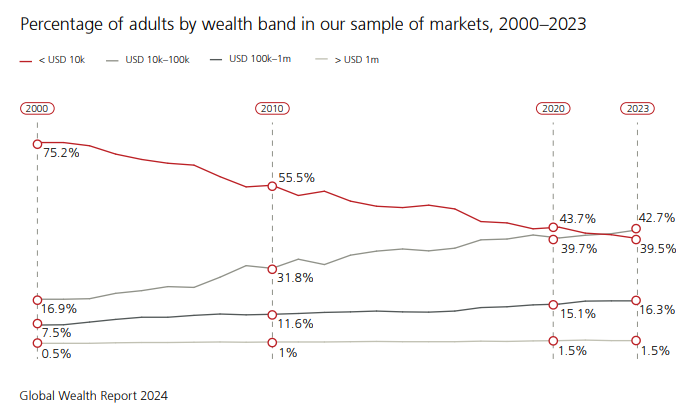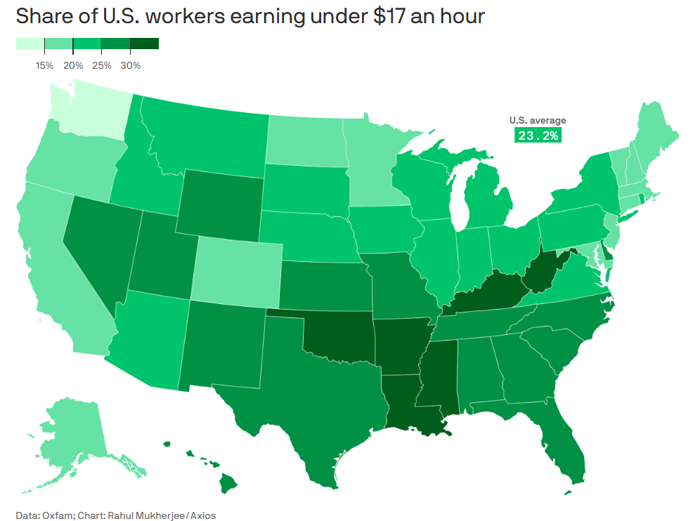There aren’t many millionaires in the world, are there? In fact, only about 1.5% of the global population holds assets exceeding one million dollars. Did you know that these individuals control nearly half of the world’s wealth? Among them, billionaires are even rarer, numbering only about 2,700. But why is it that such a small group holds so much wealth globally? And are they truly happy?
Wealth Inequality: An Ongoing Debate
The annually published UBS Global Wealth Report clearly illustrates the distribution of wealth worldwide. According to the report, the proportion of people with assets below $10,000 has decreased to less than 40% since 2000. Meanwhile, the number of people with assets between $10,000 and $100,000 has increased, now forming the largest group.
However, what stands out is the surge in the millionaire group. This group has grown from 0.5% to 1.5% of the global population. Notably, China and the United States are emerging as major players in this group. The United States boasts an impressive 22 million millionaires, the highest number in the world.
It’s common knowledge that the rich are getting richer, but it’s also important to remember that incomes for lower-wage workers are steadily rising. In the United States, for example, the proportion of low-wage workers is decreasing, which can be seen as a positive sign of income growth.

Does Wealth Guarantee Happiness?
Just because your assets increase doesn’t necessarily mean your happiness will follow suit. In fact, even wealthy individuals constantly crave more wealth. A study showed that even those who inherited large sums of money feel they need more than twice their current wealth to feel secure. This suggests that we’re often dissatisfied with what we have and always want more.
We are constantly exposed to the wealth of others through social media. Watching others take luxurious vacations in Europe, drive the latest cars, and live in massive homes creates a desire to live such a life as well. This can lead to a craving for more wealth, ultimately resulting in an endless thirst.

How Can We Quench This Thirst?
So, how can we quench this thirst? As philosopher Arthur Schopenhauer once said, “Wealth is like seawater; the more you drink, the thirstier you become.” Ultimately, we must cultivate a sense of gratitude for what we already have. Instead of constantly wanting more, it’s important to appreciate and recognize the value of what we already possess.
Acknowledging that wealth does not necessarily guarantee happiness and finding your own values are key to finding true happiness. This includes not just monetary values but also appreciating the importance of family, friends, and health.

Conclusion: Understand the Nature of Wealth and Live a Grateful Life
In the end, it’s natural to pursue wealth, but we must not forget to be grateful for what we have in the process. Rather than chasing wealth, it’s more important to find happiness in the present moment and maintain a positive outlook on your own life. Wealth may not be able to provide the happiness we truly desire. True wealth lies in being thankful for what we have and cherishing it.
Reference: A Wealth of Common Sense, “How Many Millionaires Are There?”
